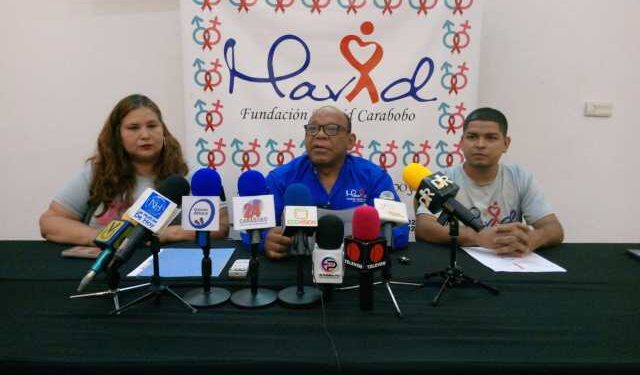Carabobo es el tercer estado de Venezuela con más personas con VIH
This December 1st marks World Day to Fight HIV and AIDS. According to the non-governmental organization ‘Manos Amigas por la Vida’ (MAVID) and Carabobo State is ranked as the third region in the country where the most people with HIV live after Zulia State and the city of Caracas.
By Correspondent lapatilla.com
The President of MAVID, Eduardo Franco, reported that currently in Carabobo 4,024 people with HIV are under treatment, of which 3,007 are men, 956 women, and the rest identify as another gender.
In the case of minors living with HIV in Carabobo, there are 225 people: 138 are between 0 and 11 years old, while 87 are teenagers.
He pointed out that MAVID recorded 475 new diagnoses from January to October 2023, which represents a decrease of 13.68% compared to the same period last year when they recorded 680 cases. He highlighted that the average age of new diagnoses is between 31 and 45 years.
Mr. Franco specified that in the first 10 months of 2023, 64 people with HIV died in Carabobo, which translates into a reduction in mortality of 47.70% compared to 2022, when 127 people died.
He pointed out that it is estimated that there are 110,000 people living with HIV in Venezuela, of which only 72,000 are receiving antiretroviral treatment.
He stressed that they are waiting for official figures from the Ministry of Health, which has not published any data since 2013.
Difficulty to have testing
Franco remarked that although Carabobo is the third state with the highest number of people with HIV, healthcare authorities have not included the state in the allocation of viral load machines, which are used to evaluate whether the treatment is working or not.
He said that only 18 viral load machines have been distributed throughout the country and this state has been left out.
Franco stated that in public laboratories there are no reagents even to perform the basic tests that a person with HIV requires to control this infection.
In addition, the president of MAVID pointed out that the public healthcare system does not guarantee medications for people living with HIV and who have also developed “opportunistic diseases” such as HPV (14.93%), Syphilis (14.93%), Chronic Diarrheal Syndrome (9.15%), Tuberculosis (6.12%), Candidiasis (6.03%) and Kaposi Sarcoma (0.52%).
Medicines are donated by the Global Fund
Franco indicated that the antiretroviral medications delivered to people with HIV were donated through the Global Fund and International Cooperation of the United Nations, because the Venezuelan State has not acquired and provided these medications since 2016.
He specified that as of now, there are enough antiretrovirals to last until April of next year.
He pointed out that in addition to the TLD, two new medications arrived that will be delivered to people who cannot take TLD because they are multi-resistant cases.
He noted that between January and October 2023, 340 people (8.45%) of the HIV population restarted antiretroviral treatment. He explained that these are people who were abroad and returned to Venezuela.
However, the report highlights that 421 people (10.56%) abandoned there treatment. Franco pointed out that this occurs because many do not have a way to get to the place where the medicine is delivered, while others do not have access to follow-up tests in private laboratories.
“We are developing a work strategy in MAVID, in conjunction with the state’s regional healthcare coordinator, in order to find a solution to support these people who abandon treatment for multiple reasons,” he said.
The president of MAVID urged the Venezuelan State to comply with article 83 of the Constitution, which establishes that: “healthcare is a fundamental social right, an obligation of the State, which will guarantee it as part of the right to life.”
He urged Nicolás Maduro’s administration to guarantee free of charge the minimum laboratory tests required by a person with HIV, as well as access to viral load tests, chest X Rays, tuberculosis tests, abdominal echoes and medications for first and second phase treatments.








